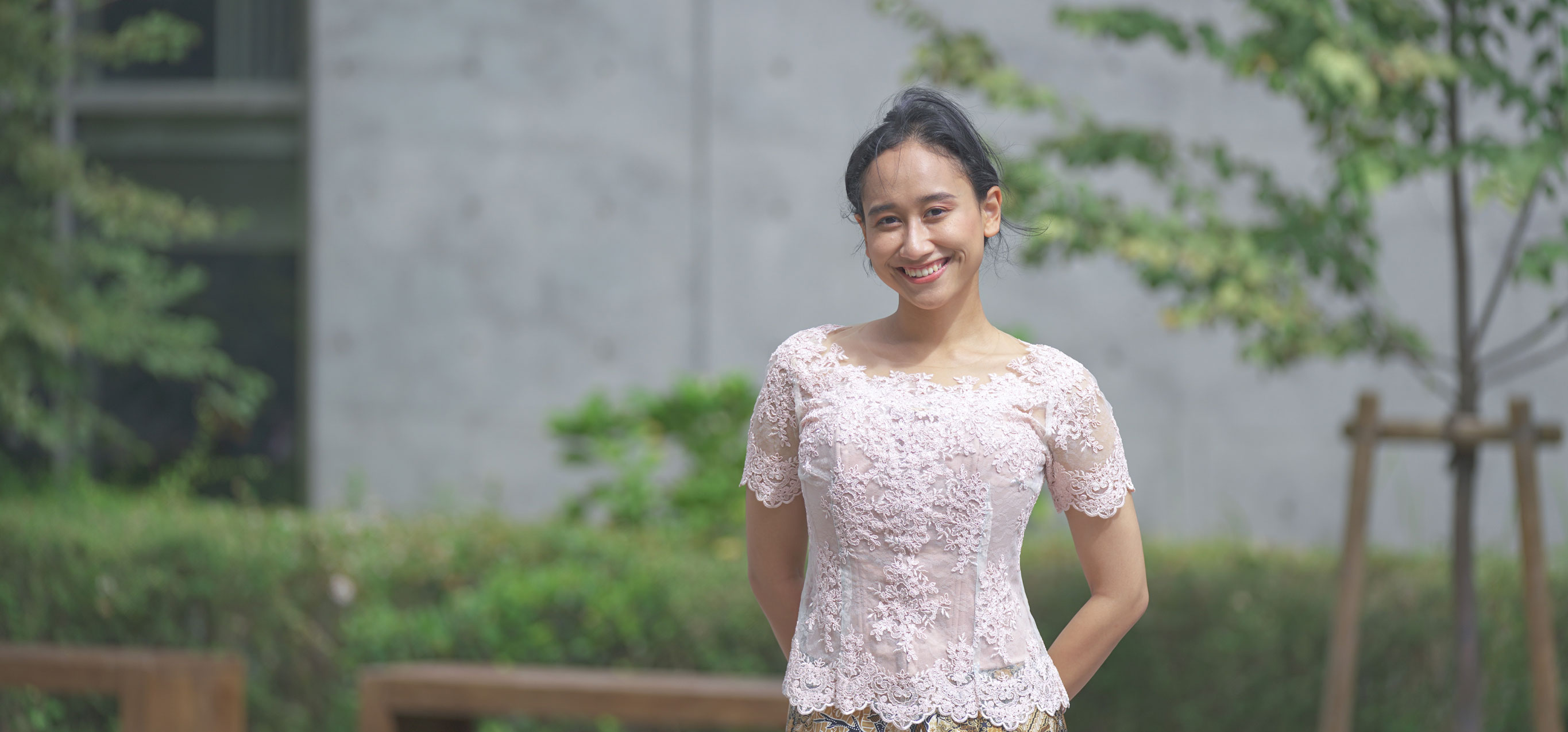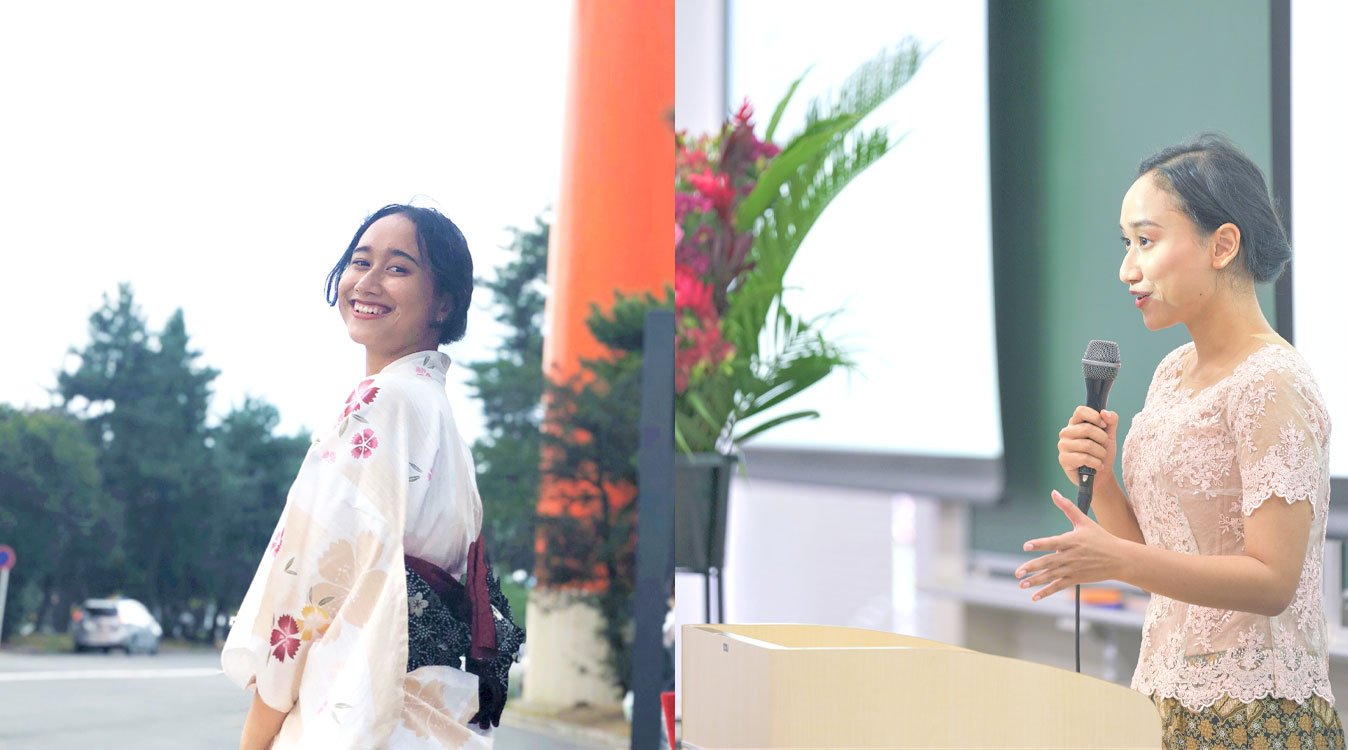
Through Global Studies major, I was able to deepen my interest while at the same time given the resources to explore other subjects.
PAMADIKEN Luna Bellina
Fourth-year Global Studies Major
We interviewed PAMADIKEN Luna Bellina, a graduate in September 2023 who was chosen as a representative of graduates, about her experiences at Ritsumeikan University.
What motivated you to apply to the College of International Relations, Ritsumeikan University, and what did you want to learn in International Relations before enrollment?
LunaAs a student from the social science major in high school, I was particularly interested with world history. I remember having to write for a final essay about the start of World War II, and I greatly enjoyed the process. Simultaneous with my growing desire to study abroad, I searched for an English program that includes a discussion of world history but is not limited to it. Additionally, it would be better if it would not be too far from my home country, Indonesia, but also not to close so I could truly experience 'living abroad independently'. I was glad that I found Ritsumeikan University's Global Studies major that I can pursue in Kyoto, Japan. Through this program, I was able to deepen my interest on world history while at the same time given the resources to explore other subjects.
What was the most fulfilling activity you participated in while at Ritsumeikan University?
LunaI enjoyed Global Simulation Gaming (GSG) a lot. It is one of Global Studies' main programs where you and your team need to roleplay as the government body of a certain state/non-state actor. I enjoyed making the introductory video in which we were utilizing our creativity to make an extraordinary presentation. The independence that was given to you to direct your own team's path throughout the course was indeed challenging, yet the most exciting part. My team had to roleplay as Sudan, and we were being criticized for our human rights abuses' allegations on during the UN General Assembly. The timing and the way you respond in a quick yet professional manner truly force you to implement the things that you learned in class or within your group discussion concerning your own actors and the ongoing issues around you. In short, I really enjoyed the simulation. Most memorable activity I have in Ritsumeikan University.
What is the theme of your graduation thesis, and why did you decide to research this topic?
LunaMy graduation thesis focuses on the deconstruction of Indonesia's debate on Papua self-determination/separatism through a postcolonial-poststructuralist approach. Basically, it questions the usually taken-for-granted 'common narrative' of Indonesians towards Papua's long history of attempt to build its own sovereign territory outside of the Indonesian republic. To understand Indonesians' 'common narrative', I had to explore two important elements: the historical upbringing of the nation-state and its consequences towards the invincible contemporary forces which shape these 'common narrative'. My thesis supervisor, Dr. Hiroaki Ataka, introduced me to the concept of 'postcolonialism' and 'poststructuralism', in which I was able to investigate the former and latter question with both concepts respectively.
I decided to research on this topic because I wanted to research about Indonesia and give back to the people in a way that I can. Studying abroad is a privilege that opens a horizon of opportunities and perspectives that allows one to understand a phenomenon from an international viewpoint. Being able to be in an environment where one can be granted freedom and space to pursue any academic interests is a chance that I want to utilize to critically engage with the issues in my own country. I chose the topic of Papua's separatism/self-determination to personally challenge my own biases about my own country and the issues associated with it.

What is your career intentions after graduation, and what made you to pursue such career path?
LunaI will be continuing my studies in Waseda University's Graduate School of Asia Pacific Studies (GSAPS) this October. Why graduate school? I do not feel satisfied with my studies yet. I feel like I can understand more of my country, but my thesis did not answer all my questions. In terms of the department, I will be researching on the politicization of religion in Indonesia. Resonating from my previous statement, in the long-run I want to give back to the people in my country through research. As a religious minority in Indonesia, I wish to explore the critical relationship between religious minority and religious majority in the political powerplays in Indonesia. In the future, hopefully I can work in a think tank or a company that focuses on Indonesia's development.
October 2023
MORE INTERVIEWS
-
Bridging Japan and the US through International Relations and Language – My Four Years in the JDP and My Global Future
INADA Mimi
Fourth-year Joint Degree Program (RU-home)2025.2.25
studentlife|academics|studyabroad|jdp|
-
While technical knowledge and job-required skills can be learnt after being on the job, some skills, such as communication, presentation, data analysis, and visualization, are the skills I was able to learn from my time at Ritsumeikan.
Pranjal Modi
RIMOWA (Global Studies Major Alumnus 2022)2025.2.4
alumni|
-
Zemi Research Convention 2024“The Integration of Human Rights into International Environmental Law and its Implications”
Ochi Seminar
(team name: Environmental Justice Analysts)2025.1.6
academics|openseminar|
-
Zemi Research Convention 2024“Are Israel's actions in Palestine considered self-defence”
Ochi Seminar
(team name: The Prosecutors)2024.12.25
academics|openseminar|
-
This supportive community empowers you to step out of your comfort zone and take on numerous challenges throughout your university life.
SUZUKI Tomoya
SAP (International Relations Major Alumnus 2018)2024.12.11
alumni|
-
Surrounded by diversified nationalities of colleagues and external business relationships, this was essentially similar to what I experienced while studying in the College of International Relations.
Joyce Lo
Mindshare (Global Studies Major Alumnus 2017)2024.12.10
alumni|